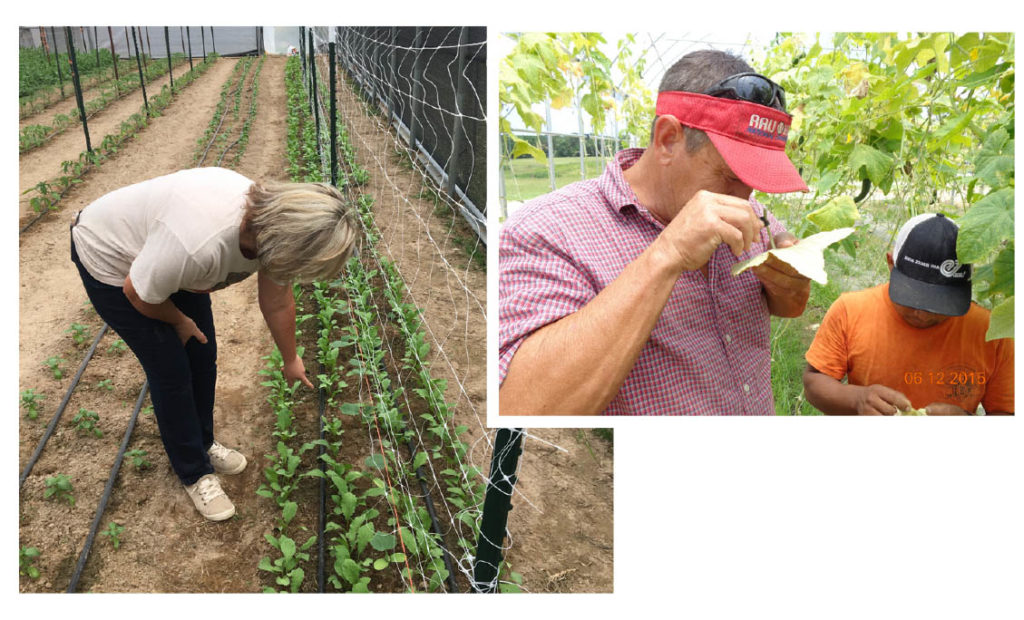By Ayanava Majumdar
When summer temperatures are soaring and you are hot and sweaty, all caterpillars may look the same. But look carefully inside the crop canopy, especially in fruit-bearing vegetables. Depending on your location, the sequence of insect pests could be different, so have a conversation with your Extension agent about what they are seeing.

WHAT TO WATCH FOR

Some of the season’s first invaders in Alabama include beet armyworm, tobacco hornworm and the tomato fruitworm.
You can tell the hornworms easily by their pattern and classic horn at the end. A tobacco hornworm caterpillar has slanted white/black stripes over green on the side of its body, with a reddish horn setting it apart from the tomato hornworm.
Beet armyworms are plump green caterpillars with smooth bodies. They may have a small black spot on the thorax behind the head.
Tomato fruitworms (also known as corn earworms) come in a range of colors from deep brown to reddish to green. These pests have lots of bristles all over and black spots.
In various parts of south Alabama edging the state border, low pressure has already been found for fall armyworms (look for the deep brown caterpillars with V-shaped marks on their heads) and southern armyworm caterpillars (notice their bright orange heads).
Squash vine borers are day-flying reddish moths that lay eggs at plant bases and behave like wasps. The drought situation seems to increase their activity or make wilting of squash plants more obvious due to the stem-boring caterpillars. Storms and other weather events will eventually carry the moths to other places. Look for egg clusters on the underside of top leaves indicating armyworms. Fruitworm and hornworm eggs are laid singly on top of leaves.

MANAGEMENT TIPS
The important issue is how to manage the insects. In organic systems, prevention is definitely better than a cure! Prevention strategies prevent establishment and early infestation of crops. So, if you are seeing caterpillars on crops, then it is already too late.
One of the best pest prevention strategies is the use of insect barrier fabric. A temporary system, insect barrier fabric can be installed over low hoops in the ground to completely enclose the small plants immediately after transplanting. Even a seven- to 10-day delay in putting the fabric over plants could result in hornworm infestation in Alabama. Super-Lite Insect Barrier and AgroFabric Pro 19 are lightweight fabrics that can stop insects while allowing light and rain penetration, but they don’t last long.
Another strategy is to try to time the planting of crops as early as possible so plants can escape the onslaught of insects until they are a bit older. This works great for crops like squash and other cucurbits that are ravaged by stem- and fruit-boring pests.
Trap cropping as a prevention strategy works great for stink bugs and leaffooted bugs. Now is a good time to establish your perimeter trap crop of sorghum and sunflower to distract the sucking pests that will be coming in large numbers very soon! Unfortunately, there is no universal trap crop, and none that are really effective for moths since they disperse too easily.

MORE RESOURCES
Check out the numerous integrated pest management videos on all these tactics on the Alabama Beginning Farmer channel on YouTube. Talk to farmers and Extension friends for more insight.
Specialty crop producers should scout weekly or more often and keep records of pest infestations and any pesticide applications. In Alabama, growers can use the Farming Basics mobile app to identify common insects, connect to commercial horticulture resources and to contact a regional Extension agent.
If you are a military veteran looking for agriculture training, see the Operation Grow special project for support.
Ayanava Majumdar is an Extension professor and entomologist at Auburn University.










